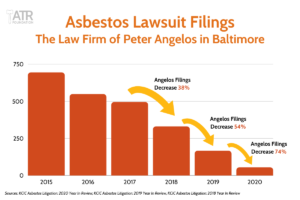Maryland’s legislative session was disappointing, but not disastrous. Lawmakers abandoned two bills that would have provided much needed COVID-19 liability protections, but no significant liability expanding bills were passed. Despite the Court of Special Appeals’ reversal of the largest medical malpractice verdict in U.S. history, Maryland’s medical malpractice climate remains unstable. The Baltimore Circuit Court is steadily working through the decades-long asbestos backlog, which primarily consists of stale, meritless filings from the notorious Law Office of Peter Angelos.
Given the Maryland legislature’s propensity to pursue liability-expanding legislation and the delicate and instable nature of asbestos litigation and medical malpractice litigation in the state, ATRF will keep a careful eye on Maryland’s civil justice system. Term-limited Governor Larry Hogan (R) has served as an important backstop and depending on the outcome of the November 2022 gubernatorial election, lobbyists for the plaintiffs’ bar could be further emboldened.



 Yet again, Maryland lawmakers failed to pass crucial COVID-19 liability protections. Egregiously, lawmakers failed to even vote on two promising bills,
Yet again, Maryland lawmakers failed to pass crucial COVID-19 liability protections. Egregiously, lawmakers failed to even vote on two promising bills, 


